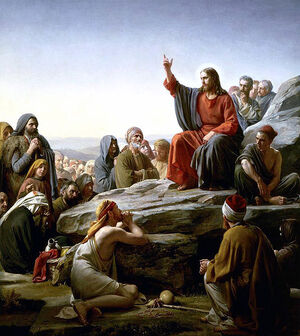
Christians believe that Jesus is the mediator of the New Covenant (see Hebrews 8:6). Depicted is his famous Sermon on the Mount in which He commented on the law. Some scholars (see Antithesis of the Law) consider this to be an antitype of the proclamation of the Ten Commandments or Old Covenant by Moses from the biblical Mount Sinai[1].
"The law of Christ" is a phrase of uncertain meaning found in the Apostle Paul's Epistle to the Galatians of the New Testament.
Supersessionists and dispensationalists believe this either "replaces" or "completes" the previous Law of Moses of the Hebrew Bible, while dual-covenant theologians reject this belief.
Closely related are the subjects of biblical law in Christianity and early Christianity and Judaism.
The law of Christ in the Pauline epistles[]
In the Epistle to the Galatians, written by Paul of Tarsus to a number of early Christian communities in the Roman province of Galatia in central Anatolia, he wrote: "Bear one another's burdens, and so fulfill the law of Christ." (Galatians 6:2, NKJV). This could be an allusion either to the Great Commandment or the New Commandment. In a letter to the early Christians of Corinth, Greece, in the First Epistle to the Corinthians, Paul wrote: "To those not having the law I became like one not having the law (though I am not free from God's law but am under Christ's law), so as to win those not having the law." (1 Corinthians 9:21, NIV).
It is not clear exactly what Paul means by the phrase, "the law of Christ". Although Paul mentions Biblical law several times (e.g., Romans 2:12–16, 3:31, 7:12, 8:7–8, Galatians 5:3, Acts 24:14, 25:8) and preached about Ten Commandment topics such as idolatry (e.g., 1 Corinthians 5:11, 6:9–10, 10:7, 10:14, Galatians 5:19–21, Ephesians 5:5, Colossians 3:5, Acts 17:16–21, 19:23–41), he consistently denies that salvation, or justification before God, is based on "works of the law" (e.g., Galatians 3:6-14), though the meaning of this phrase is also disputed by scholars, see for example the New Perspective on Paul#Works of the Law.
The law of Christ in the gospels[]
Many Christians believe that the Sermon on the Mount is a form of commentary on the Ten Commandments. It portrays Christ as the true interpreter of the Mosaic Law.[1] In the Expounding of the Law, Jesus said that he did not come to abolish the law or the prophets, but to fulfill (Matthew 5:17). In the apocryphal Gospel of Marcion's version of Luke 23:2 we find the extension: "We found this fellow perverting the nation and destroying the law and the prophets".[2]
While the New Testament records several sayings of Jesus Christ that may be described as "commandments," it only records one that he explicitly identified as such. This is the "New Commandment" of John 13:34 to love another as he himself had loved.
New Testament law in the Epistle of James[]
Related to the concept of the law of Christ and so-called "New Testament law", James 2:8-13 uses the phrases of "royal law" and "law of liberty" in reference to the Old Testament's Great Commandment, part of Leviticus 19:18:
| “ | You shall love your neighbor as yourself. | ” |
See also[]
- Pauline Christianity
- Biblical law in Christianity
- Antinomianism
- Sermon on the Mount
- Expounding of the Law
- New Covenant
- Law and Gospel
- Ministry of Jesus
- Council of Jerusalem
- Cafeteria Christianity
- Ten Commandments
- Evangelical counsels
- The New Commandment
- Red-Letter Christian
References[]
- ↑ 1.0 1.1 "Sermon on the Mount." Cross, F. L., ed. The Oxford dictionary of the Christian church. New York: Oxford University Press. 2005
- ↑ Ante-Nicene Fathers: Tertullian: Against Marcion: Dr. Holmes' Note: "In [Luke 23:2], after the words "perverting the nation," Marcion added, "and destroying the law and the prophets; Gospel of Marcion: Jesus Before Pilate and Herod
